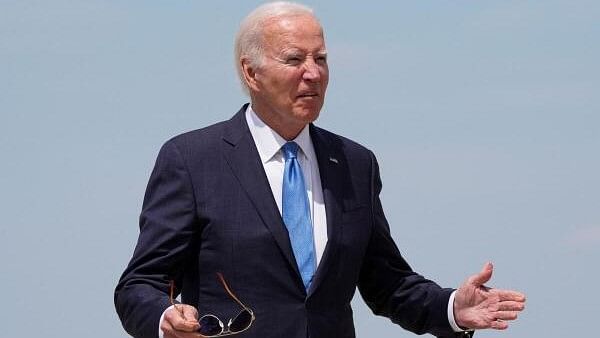
US President Joe Biden
Credit: Reuters Photo
The kaleidoscopic attributes of party politics in the United States are creating constantly changing patterns on an almost daily basis. The past week, Sunday to Sunday, literally shook the world with the assassination attempt against Donald Trump, which he promptly claimed as a sign of divine intervention. But then, the week ended with the anti-climactic man-made disaster of President Joe Biden being literally forced to give up his bid for re-election almost at the finishing line — and having had to put a brave face on it via a letter to 'Fellow Americans'.
A turn in the kaleidoscope can add to the swirl of uncertainties in the outcome of the November 5 elections. Going forward, the selection of the Democratic Party’s nominee promises a thrilling finale. Democrats are left with less than a month for their convention in Chicago to present a new candidate and tell a new story.
Meanwhile, Biden remains in the Oval Office for another six months. This too is a potentially consequential scenario, since dialogue between Washington and Moscow should be expected already under the next administration. There is a controversial past circa 2015 when under Barack Obama a fake controversy about Candidate Trump’s ‘Russia collusion’ was hatched, which literally stalked the latter’s presidency. If Biden’s mental acuity is no longer up to the job, shouldn’t that include his job as president as well?
An embittered president with a failing memory is poised to exercise absolute political power. It is no secret that Biden is sniffy about the elite Democrats who smothered his candidacy. In a caustic op-ed, Maureen Dowd, the columnist of the New York Times wrote on Sunday, “He’s still bitter that Obama pushed him aside for Hillary in 2015, so he doesn’t want to hear from either of them. Obama always seems to be leading Joe off the stage… and Joe resents it.” Interestingly, Obama hasn’t yet supported Kamala Harris.
In an eloquent statement giving fulsome praise to Biden’s patriotism, Obama concluded, “We will be navigating uncharted waters in the days ahead. But I have extraordinary confidence that the leaders of our party will be able to create a process from which an outstanding nominee emerges.” The Senate majority leader Chuck Schumer and House Leader Jeffries Hakeem toed the Obama line, refraining from mentioning Harris, while praising Biden’s decision to exit the race.
Suffice to say, although Harris is an increasingly likely candidate, momentum may build up for an open convention. Many Democratic party politicians have said they favour an open nominating process instead of appointing Harris by default. Representative Alexandria Ocasio-Cortez cautioned last week in a widely discussed social media post, “If you think that there is consensus among the people who want Joe Biden to leave… that they will support Kamala, Vice President Harris, you would be mistaken.”
An actual contested convention has no precedent in living memory. This is the first time in more than half a century after Lyndon Johnson that a US president has refused to be re-elected. A ‘test vote’ may even become necessary to fathom the strength of a candidate, while the 700 automatic ‘superdelegates' (members of Congress, governors, state party chairs, etc.) remain the X factor.
Suffice to say, the chances are that the upcoming Democratic convention will be more contested than any in more than half a century. Therefore, the convention rules — who can vote on what ballot, how free the delegates are, and so on — are going to be the game changers. Different outcomes are possible depending on how the variables are juggled and refined behind the curtain by the movers and shakers in the party establishment.
Meanwhile, what happens to the 3,896 ‘pledged’ delegates, chosen in primaries and caucuses representing well over 90% of the elected delegates, who had endorsed Biden? The existing rule gives these delegates the latitude “in all good conscience (to) reflect the sentiments of those who elected them.” Suffice to say, these delegates are like free birds in an open cage under no obligation to follow whatever preferences Biden may express. This is where the ‘superdelegates’ come to assume a larger-than-life influence.
What happens at this point is up to the convention itself, which always has the power to adopt, amend or discard existing rules. It is impossible to predict the political consequences of an open convention. The paradox is, that rules are made for a desired outcome, which could potentially lead to a coalescing around Harris as next in line. When the kaleidoscope turns, however, God may dispose of what man proposes.
(M K Bhadrakumar is a former diplomat.)
Disclaimer: The views expressed above are the author's own. They do not necessarily reflect the views of DH.